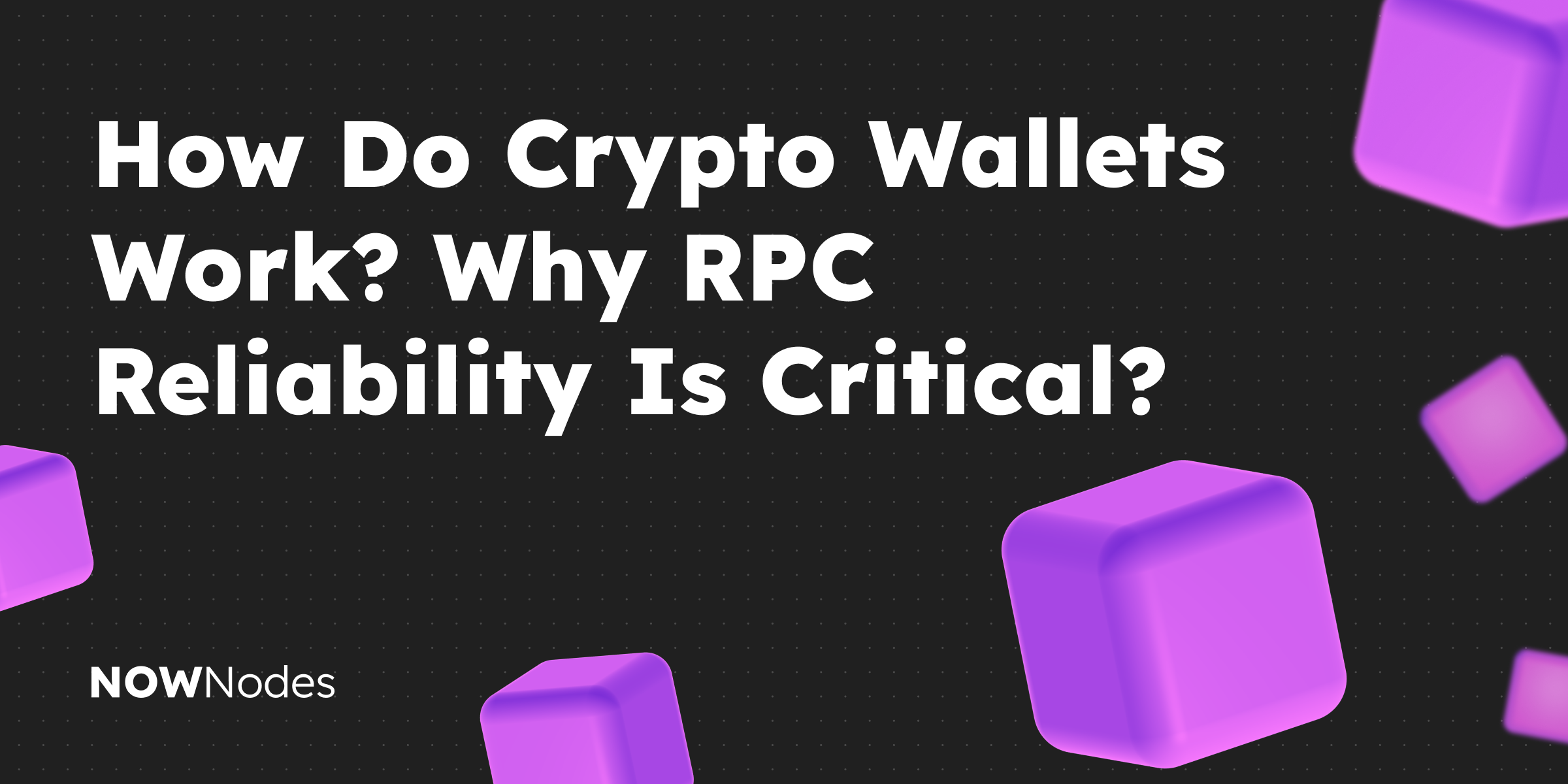Crypto wallets are the front doors of Web3. For millions of users, they are the interface to digital assets, decentralized applications, and financial sovereignty. But behind the sleek interfaces of wallets lies complex infrastructure – and one of the most crucial components is the RPC (Remote Procedure Call) layer.
If you’re building or scaling a wallet, understanding how crypto wallets work – and particularly how they rely on RPC infrastructure – is essential. Even more important: knowing why your choice of RPC provider directly impacts your users, your engineering velocity, and your bottom line.
How Crypto Wallets Interact With the Blockchain
At their core, wallets generate and store private keys, sign transactions, and manage account data. But wallets do not directly talk to blockchains on their own. To query balances, fetch token metadata, read contract states, or send transactions, wallets need to interface with blockchain nodes. That happens via RPC endpoints.
An RPC endpoint acts as a messenger between the wallet and a full node. When a user opens the wallet and sees a token list, checks gas fees, or approves a swap, the wallet sends RPC requests to the node – typically over HTTP or WebSockets.
This means a wallet is only as reliable as the RPC endpoint it talks to.
Why RPC Infrastructure is a Make-or-Break Component
In most modern wallets, RPC connectivity is handled behind the scenes. But when things go wrong – latency spikes, missed blocks, stale data, or endpoint downtime – the user experience suffers immediately.
Common RPC-related problems include:
- Incorrect or missing token balances
- Delays in transaction confirmations
- Failed smart contract calls
- dApps refusing to connect
- Wallet freezing or becoming unresponsive
To the user, all of these are “wallet bugs.” In reality, they’re infrastructure failures. And this is why RPC reliability is not just a backend concern – it’s a product issue.
Why Wallets Should Not Run Their Own Node Infrastructure
Some wallet teams consider running their own nodes to have maximum control over the stack. But this approach has serious trade-offs – in cost, complexity, and risk. Here’s why relying on a managed RPC provider is typically the smarter choice:
1. Operational Complexity and Maintenance Overhead
Running full nodes requires continuous attention: syncing, upgrading, indexing, reprocessing chains after forks, dealing with client bugs, monitoring hardware, handling restarts, managing disk space, and more. Across multiple chains, this becomes a full-time infrastructure team.
Using a provider eliminates this burden entirely – no node babysitting, no surprise outages, no 3 a.m. pager alerts.
2. High Infrastructure Costs
To achieve production-grade reliability, you’ll need:
- Multiple nodes per chain for redundancy
- Load balancers and failover mechanisms
- High-availability zones in multiple regions
- Scalable architecture to handle spikes
This infrastructure can cost tens of thousands of dollars per month just to match what a good RPC provider offers out of the box.
3. Lack of Observability
Building your own observability stack – with metrics, logs, latency tracking, and error classification – adds another layer of engineering work. Leading RPC providers offer dashboards, usage analytics, and real-time performance insights, saving months of tooling development.
4. Security Risks
Public node exposure can lead to abuse (e.g., DDOS, spam requests) if not properly rate-limited or protected. Misconfigured nodes can also leak metadata or expose vulnerabilities. With a managed provider, request handling, rate control, and isolation are handled by professionals with deep security experience.
5. Multi-Chain Headaches
Running and syncing Ethereum nodes is hard. Adding BNB Chain, Polygon, Arbitrum, and Solana multiplies that difficulty. Each has different hardware demands, clients, sync modes, archive options, and tooling.
A single provider that supports all major chains saves massive engineering effort, unifies tooling, and speeds up multi-chain wallet launches.
6. Faster Development and Time to Market
With managed RPC endpoints, developers can get started in minutes instead of weeks. There’s no delay for node syncing, provisioning infrastructure, or building API layers. This accelerates prototyping, QA testing, production deployments, and cross-chain expansion.
7. Global Performance Optimization
Top-tier RPC providers operate globally distributed infrastructure, with latency-based routing and geo-redundancy built in. Your users in Asia, Europe, and the US will all experience fast response times – without you needing to deploy nodes across continents.
8. Built-In Reliability and SLA Commitments
Reputable providers offer service-level guarantees, 24/7 uptime monitoring, automated failover, and horizontal scaling – something that’s extremely difficult to achieve in-house unless you’re a dedicated infra company.
We provide:
– High-performance RPC endpoints with automatic load balancing
– 99.95% uptime backed by SLA
– Low-latency responses via global edge infrastructure
– Real-time monitoring, dashboards, and alerting
– Full support for Ethereum, Polygon, BNB Chain, Arbitrum, Optimism, and 100+ chains
– Easy SDK integration and developer-first tooling
Instead of running your own infra, focus on what matters – building a wallet your users love. We’ll make sure it’s fast, stable, and always online.
Conclusion
Crypto wallets are only as good as the infrastructure behind them. While the user experience lives in your frontend, the real-time responsiveness, accuracy, and reliability depend entirely on the RPC layer. Choosing to build and maintain your own node infrastructure may seem appealing for control, but in practice, it introduces operational complexity, cost, and risk – all of which can be avoided by using a high-quality managed RPC provider.
In an industry where milliseconds matter and user trust is hard-won, infrastructure is not the place to cut corners. By partnering with a reliable RPC provider, wallet teams can deliver faster, more stable, and more secure products – without the distractions of low-level node maintenance.



